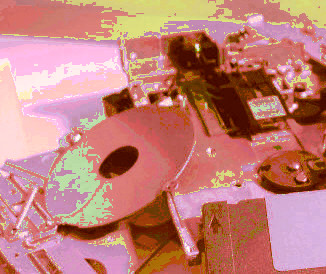
It’s a hard life for your average computer. Disks fail, components break, operating systems get corrupted. That’s life, and if you’re not prepared, you’re likely to suffer. I just had a laptop go into meltdown which required a lengthy restore process, so I thought it might be useful to take a look at the current state of the market in backup, recovery and imaging software.
The first thing to report is that things have really changed recently, the market is no longer dominated by proprietary expensive tools. Now you can choose from a selection of different free products to backup and safeguard your data. Which means there’s absolutely no excuse for not keeping backups or disk images in case of emergency. The best of them even support automatic scheduling, which gives you fire and forget coverage.
So here’s my pick of the best and the rest of free tools currently on the market.
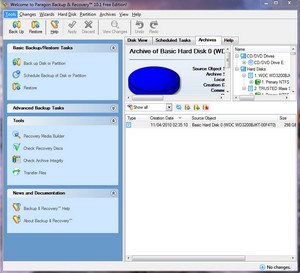
Paragon Backup & Recovery Free Edition. The new free version of this venerable program comes with a superb interface and full functionality, both for grabbing disk images (which you can use to do a ‘bare metal’ re-install to a new disk or your existing disk if you suffer a catastrophe) and standard everyday file and folder backups.
You get a great in-built scheduler, differential backup, file restore and a basic partition manager, as well as crucial tools like an archive integrity checker. In practice it runs quickly (a full backup of some 100GB takes around 2 hours), although for some weird reason they’ve hidden the differential scheduling function under a sub-menu, which is probably to encourage you to upgrade to the commercial package. All in all though, this is a serious tool, with an upgrade path if you need more power.
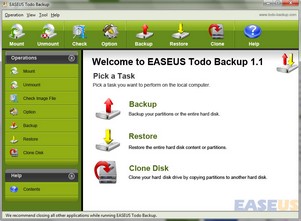
EASEUS ToDo Backup. A beautifully simple interface again offers a choice between disk cloning and data backup, along with selective file restore. However there’s no inbuilt scheduling, which means you have to fall back on to the Windows Scheduler, which may be a little too complex for many people. Apart from that, this program works excellently, and will clone a large disk in a reasonable amount of time (again around 3 hours for a 100 GB disk).
The thing to remember is the fact that cloning in ToDo terms, means copying the disk across exactly as it is on the source, not into a hot metal restore format. To do a proper disk image you need to select backup ‘create image by sector’. A tad confusing. Again as with Paragon, you can split files, change compression levels, mount partitions and test the archive integrity, so the feature set is pretty good.
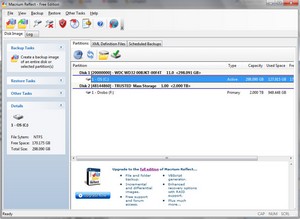
Macrium Reflect. This is another free offering from a traditional commercial company. Like Paragon, it supports hot imaging, and comes with a nice wizard to make the backup and restore process as easy as possible. The program sports a nice internal scheduler for automatic scheduling of backups, which comes with its own easy to use wizard. For some reason the scheduler is buried in a right mouse click function, rather than a nice button on the main nav bar, which seems crazy.
I also found the interface to be a little more confusing than the previous two programs, with unnecessarily complicated requirements for setting up backup/imaging sessions. Even using the wizard, folder navigation was far from easy. As with most of the XML products, the cost of standardisation appears to be speed, with backups taking significantly longer than the others, twice as slow or more in some cases.
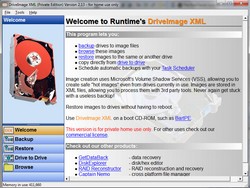
DriveImage XML. This freeware program sports a minimalist interface, and functions solely to image your disk, with no pretensions to file and folder backup. In a kind world, we can say it’s a no frills product, and again it makes use of the Windows scheduler for setting up automated archiving. Strangely you need to run it in Administrator mode to get it to recognise your internal hard drive in Windows Vista/7, and once running it had trouble locking my drive to do a hot image. It’s an XML program again, which means slower operation.
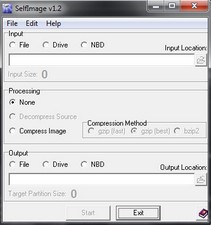
SelfImage. A small freeware imaging program which can hot image not only Windows but also Linux partitions from within Windows. Minimalist interface means you can get this puppy up and running instantly, but it’s clearly more for cloning a disk from one to another with minimal messing around. If you need to do anything more sophisticated, you’ll need something else. There’s no rescue disk feature for example, although that’s planned for the future.
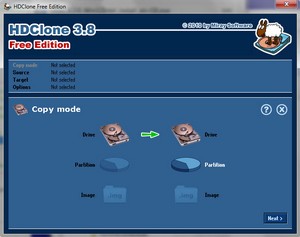
HD Clone. Another quick and dirty hard disk cloning program. The free version gives you basic disk to disk, partition to partition imaging, which is great for cloning an old drive up to a shiny new large drive. The free version is also deliberately speed hobbled, so you’ll need to be prepared to wait a while if you have a large disk you want to upgrade or restore.
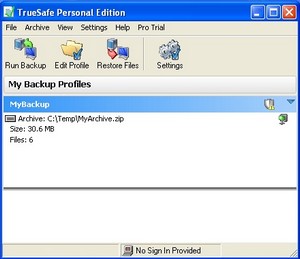
Truesafe Personal Edition. Free version of the company’s commercial product, with a severely crippled set of features and a nasty nag screen which keeps asking for you to sign up for a Truesafe account. The program purportedly includes a fairly rudimentary file and folder backup scheduler, but it’s hard to tell since I couldn’t get the thing to work at all. An excellent example of how not to supply free software to boost your commercial offerings.
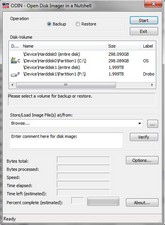
ODIN Imager. Another one trick solution, disk imager and cloner. Set it up to snapshot your drive and it will happily do the job, no frills. Press the other button and you’ll get to restore. No frills. The program can, however, be run from a USB stick, and it does support multiple CPUs, although in testing it was still pretty slow to do the job. Speed comes at a price it seems. For a new open source project it does have some nice features, however, like verify, file splitting and backup of only used areas. Worth a look.
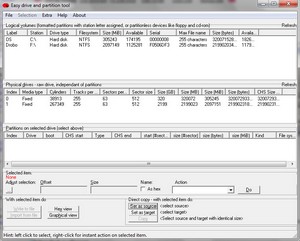
Dubaron DiskImage. You don’t get much geekier than this ancient open source project. The shudderingly intricate user interface hides a legion of functions and pitfalls for the unwary. Hex view, virus scan, checksum your drives and partitions. Read the master boot record, even. And of course image your disk for safekeeping. Definitely not one for the faint hearted.
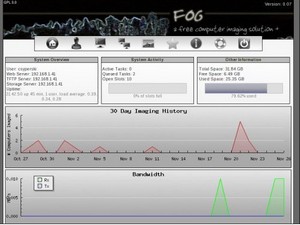
FOG Disk Cloner. Fog is a Linux based disk cloner designed to let people remotely clone Windows XP/Vista hard drives. Why? Well if you’re the admin of a large population of PCs this is a quicker, cleaner and faster way of adding new machines than manually installing new Windows installations each time a new computer is purchased. If you’re not into hardcore sysadmin, stay away from this puppy, ‘cause it will make your eyes hurt.
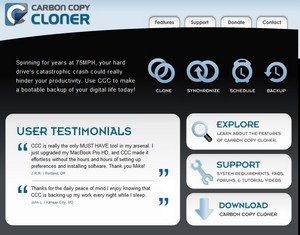
Carbon Copy Cloner. Donation-ware Mac disk cloner, lets you image, backup and restore your Mac on demand. Supports incremental and scheduled backups and allows for sector by sector cloning to replicate your computer drive on an external. From the reviews it appears to do the job.
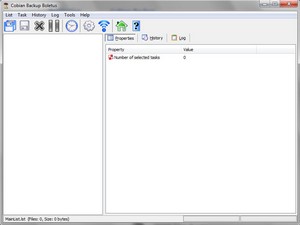
Cobian Backup. One man band freeware (earlier versions open source) which provides very basic file and folder backup facilities. How basic? No automatic restore for one. And the UI, while easy to use, is not what you’d call rich. There are, however, some fascinatingly useful features included in this little program. For one it supports strong encryption. It also supports simultaneous upload to FTP drives, which is something products like Paragon do, but at a price.
This one feature is actually worth installing the software for, if only to set up a regular backups (yes scheduling is also included) of your most important files to your family or business web server. And properly encrypted against prying eyes. You can set up incremental and differential backups and set multiple archives for extra safety. It may not be a real serious safety net for your machine, but it’s definitely worth thinking about for those really important files in your life.
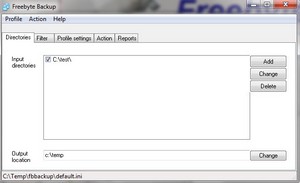
Freebyte Backup. Simple file and folder backup, with a useful set of options for backup settings. You can do incremental as well as, interestingly, date governed backups, which could be quite helpful if you’re running a lot of date ordered data. There’s also a handy Simulate button, which means you can test your backup criteria before committing to the real thing.
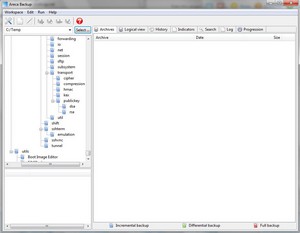
Areca Backup. Cross platform (Linux/Windows) open source program which features the most impenetrable user interface ever created by man. I hate ragging on Open Source, because it’s actually someone’s back breaking hard work, given of their own free will, but in this case I have to say it needs work. A lot. A simple Create a Backup wizard would help. As would a change of terminology. A target and repository? Oh, you mean a Source and Destination. Ahh… Give this one a few more months on the pot to simmer perhaps?
Conclusion. The bottom line is there’s now choice, and not just commercial choice. The range of free imaging and backup programs is really surprising, but also encouraging. The fact is that people will upgrade for better features if they like a program enough, and in this regard freeware is a big win for both companies and users.
My vote definitely goes to the Paragon Backup & Recovery Free Edition. Not only does it work well and work fast, but it also offers a solid sweep of features which cover just about everything you need to keep your machine safe and secure against mishap. I also like the upgrade path to more features like FTP upload, and the fact that this is a company which is going to maintain their development and support.
Continue Reading… 1 2 3 [View All]




Is “easy backup wizard” also a scam and is there any software out there that does backup and copy your games?